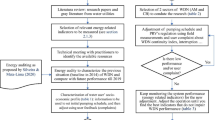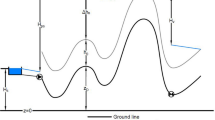Abstract
Cities in Sub-Saharan Africa suffer from widespread disparities in water supply due to depletion in groundwater and global-warming-induced changes in weather patterns. The offset of water head from the design considerations of water pumping systems has increased energy requirements leading to worsening of the situation with respect to availability of energy and water. Consequently, highly capitalized water supply schemes, which have been designed to meet the demand, are underutilized leading to operational inefficiencies. Robust empirical equations can help detect inefficiencies in water pumping systems, and this paper discusses the equations which were developed by analysing data obtained from various water supply utilities facing water scarcity. These equations provide cost-benefit analysis for decision making in water utilities and can bring about energy efficiency in municipal pumping operations.







Similar content being viewed by others
References
Biswas, A., & Ching, L. (2011). Why water weeks count. Singapore: The Strait Times. Water World 2011.
Diniz, A. M. F., Fontes, C. H., Da Costa, C. A., & Costa, G. M. N. (2014). Dynamic modeling and simulation of a water supply systems with applications for improving energy efficiency. Energy Efficiency Journal. doi:10.1007/s12053-014-9292-4.
Halpeth, M. K. (2002). Emerging trends in energy management of pumping system. .Sponsor- Indian pump manufacturers association. Journal of the Institution of Engineers, 36-43.
International Energy Agency. (2008). World energy outlook 2008. International energy agency. Paris http://www.worldenergyoutlook.org/media/weowebsite/2008-1994/weo2008.pdf Accessed on 26 Sept 2013.
International Energy Agency. (2012). CO2 emissions from fuel combustion highlights. 2012 Edition. 111-113. www.iea.org http://www.iea.org/co2highlights/co2highlights.pdf Accessed on 6 Oct 2013.
International Rivers. (2009). Energy efficiency: the greenest electricity source. Publication of the International Rivers. www.internationalrivers.org.
IPCC. (2007). Climate change 2007: the physical science basis. Contribution of working group I to the fourth assessment report of the intergovernmental panel on climate change. Cambridge: Cambridge University Press.
Jacob, K. (2012). Africa yearns for electricity. Wartsila report. Finland. 7-10 www.smartpowergeneration.com. Accessed on 13 Oct 2013.
Lamptey, B. (2011). Vulnerability and climate change hotspots in Africa mapping based on existing knowledge. First conference on climate change and development in Africa (CCDA-I). Development First: Addressing Climate Change in Africa, Addis Ababa, Ethiopia.
Plappally, A. K., & Lienhard, V. J. H. (2012). Energy requirements for water production, treatment, end use, reclamation and disposal. Renewable and Sustainable Energy Reviews, 16, 4818–4848.
Rogers, P., de Silva, R., & Bhatia, R. (2002). Water is an economic good: how to use prices to promote equity, efficiency and sustainability. Water Policy, 4(2002), 1–17.
Ruth, M., & Gasper, R. (2008). Water in the urban environment: meeting the challenge of a changing climate. OECD International Conference: Competitive Cities in Climate Change. Milan. Italy.
Seckler, D., Molden, D., & Barker, R. (1998). Water scarcity in the twenty first century. IWMI Water Brief 1. Colombo: International Water Management Institute (IWMI).
TERI. (2009). Best practices guide: energy efficiency in municipal water pumping, Bangalore. India. 59-71.
TERI. (2013). Municipal energy efficiency outreach programme reports (2002–2013). Bangalore. India.
UN. (2010). World urbanization prospects: The 2009 revision. United Nations. Department of Economic and Social Affairs. Population Division. New York. NY http://esa.un.org/unpd/wup/Documents/WUP2009_Highlights_Final.pdf Accessed on 24 Sept 2013.
UNECA. (2013). Assessing progress in Africa towards the millennium development goals: Food security in Africa - Issues, challenges and lessons. MDG report 2013.
UN-Habitat. (2011). Cities and climate change global report on human settlements 2011. http://www.zaragoza.es/contenidos/medioambiente/onu/538-eng-ed2011.pdf Accessed on 3 Oct 2013.
Variravamoorthy, K., Gorantiwar, D. S., & Pathirana, A. (2008). Managing urban water supplies in developing countries – climate change and water scarcity scenarios. Physics and Chemistry of the Earth, 33(2008), 330–339.
World Health Organization and UNICEF 2006 Report. (2006). Meeting the MDG drinking water and sanitation target: the urban and rural challenge of the decade. http://www.wssinfo.org/fileadmin/user_upload/resources/1198239354-JMP_06.pdf Accessed on 29 Sept 2013.
World Health Organization and UNICEF 2012 Report. (2012). Progress on drinking water and sanitation 2012 update http://www.unicef.org/media/files/JMPreport2012.pdf Accessed on 24 Sept 2013.
Acknowledgments
The authors thank UNHABITAT for providing opportunities to work with Urban Water Supply Companies on energy efficiency projects. We would also like to thank the following water and electrical utility for sharing the data and information of Addis Ababa Water and Sewerage Authority (AAWSA), Ghana Water Company Limited (GWCL), National Water and Sewerage Corporation (NWSC), Office National Del’Eau etdel’ Assainissement (ONEA), Plateau State Water Board (PSWD), Societe Malienne De Gestian De Leau Potble—S.A (SOMAGEP—S.A) and Zimbabwe Electricity Transmission and Distribution Company (ZETDC).
Author information
Authors and Affiliations
Corresponding author
Rights and permissions
About this article
Cite this article
Rao, G.R.N., Ahmed, S., Sailaja, R.R.N. et al. A decision-making approach for energy efficiency improvement in municipal water pumps during water scarcity scenario. Energy Efficiency 9, 141–151 (2016). https://doi.org/10.1007/s12053-015-9354-2
Received:
Accepted:
Published:
Issue Date:
DOI: https://doi.org/10.1007/s12053-015-9354-2




